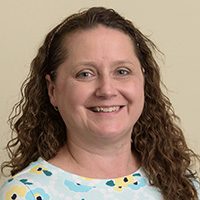Amanda Harmon
Associate Professor of Psychology
Student Center Building
P843-863-7712 / Eaharmon@csuniv.edu
CREDENTIALS
MS, PhD

Dr. Amanda Harmon received her Doctor of Philosophy in Experimental Psychology with a focus on neurodevelopmental disabilities from the University of Louisville in 2020. She received her Master’s in Experimental Psychology from the University of Louisville in 2011. In addition, she received a Master’s in Biobehavioral Health from Pennsylvania State University in 2008, focused on Behavioral Endocrinology, and her Bachelor’s in Human Development and Family Studies from Pennsylvania State University in 2006 with an emphasis on youth and children.
Dr. Harmon is married to a local pastor, Dr. Billy Harmon, and together they enjoy serving the community and their church, New Life Baptist Church. The Harmons have four wonderful children (two are CSU graduates) and three beautiful grandchildren. Dr. Harmon desires to help her students integrate academic knowledge of psychology with the Christian faith while applying psychological concepts to daily life. Her dissertation was titled “Language ability and concurrent predictors of pragmatic communication in children with Williams syndrome or 7q11.23 Duplication syndrome.” Her current research focuses on siblings and families of children with disabilities, and family reunification programs.
Your Purpose. Our Mission.
I try to spend the extra time with students to get to know them. I work with the online students in the psychology department as well as our on-campus students. I really enjoy encouraging students to do research and enjoy seeing them present their work.
Dr. Amanda Harmon, PhD
- PUBLICATIONS & PRESENTATIONS
Publications
Farwig, K., Harmon, A. G., Fontana, K. M., Mervis, C. B., & Morris, C. A. (2010). Genetic counseling of adults with Williams syndrome: A first study. American Journal of Medical Genetics, 154C, 307-315.
Harmon, A. G., Towe-Goodman, N., Fortunato, C., & Granger, D. (2008). Use of salivary alpha-amylase in biobehavioral research: A note of caution. Hormones and Behavior, 54, 592-596.
Harmon, A. G., Hibel, L. C., Rumyantseva, O., & Granger, D. A., (2007). Measuring salivary cortisol in studies of child development: Watch out - what goes in may not come out of commonly used saliva collection devices. Developmental Psychobiology, 49, 495-500.
Granger, D. A., Kivlighan, K. T., Fortunato, C., Harmon, A. G., Hibel, L. C., Schwartz, E. B., & Whembolua, G-L (2007). Integration of salivary biomarkers into developmental and behaviorally-oriented research: Problems and solutions for collecting specimens. Physiology and Behavior, 92, 583-590.
Posters:
Brandt, K. & Harmon, A. (2024, March). Investigating the Connection Between Reading for Pleasure and Self Esteem. Southeastern Psychological Association, Orlando, FL.
Chenault, P. & Harmon, A. (2024, March). Relationship with God, Life Satisfaction and Coping with Stress in Christians. Southeastern Psychological Association, Orlando, FL.
Brummett, A. & Harmon, A. (2023, April). Color Preference and Personality. Center for Interdisciplinary Writing and Research Virtual Undergraduate Research Conference. Daytona Beach, FL. https://ciwr.net/vurc/
Morris, C. A., Mervis, C. B., Klein-Tasman, B. P., Velleman, S. L., Harmon, A., Osborne, L. R. (2021, September 10 – 15). Triplication of the Williams syndrome region with a contiguous distal 2.6 MB duplication of 7q11.23: A severe phenotype. David W. Smith Workshop, Stevenson, WA. https://www.dwsmith.org/.
Harmon, A. G. & Mervis, C. B. (2021, April). Concurrent predictors of pragmatic communication in children and adolescents with Williams syndrome. Gatlinburg Conference
- MEMBERSHIPS & AFFILIATIONS
Southeastern Psychological Association
